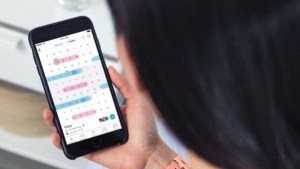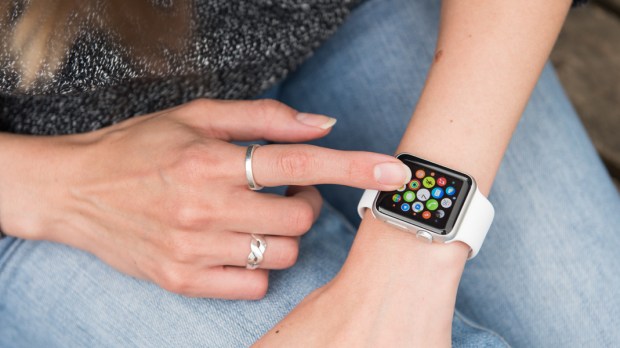Have you heard that FitBit wants to help you track your period now? An update to the FitBit app promises to allow some versions of the device to help women keep track of their menstrual cycles. But period-tracking apps are nothing new, and the FitBit is yet another addition to the growing number of programs and devices that claim to help women keep track of their cycles, put them in better touch with their bodies, and help them naturally achieve or postpone pregnancy. All admirable goals … but as a trained Natural Family Planning (NFP) or Fertility Awareness-Based Method (FABM) instructor, I caution friends who come to me asking about the various menstrual-tracking apps that abound these days.
First of all, it’s wonderful that so many women are taking a greater interest in their reproductive health. In fact, FitBit says they added the new “female health tracking” capability precisely because it was one of their most requested features from FitBit users. According to a recent survey conducted by FitBit, 80 percent of their female users were unable to correctly identify how many phases there are in a menstrual cycle, so obviously there’s a real need for anything that can help educate women about their bodies.
But with the recent explosion of fertility-tracking apps and “fem-tech” gadgets in recent years, it’s important to let women know that not all of these “innovations” are created equal – in fact, some can be downright archaic.
Outdated and inaccurate methods
Although some of these female health tracking apps may seem cutting-edge because they come in app form, some of them actually rely on a very old, very ineffective method of family planning: the Rhythm Method — a notoriously ineffective means of preventing pregnancy that relied on a woman’s past cycle length to predict her fertile window during each cycle. Because the RM did not use real-time fertility data (such as cervical mucus observations, basal body temperatures, and cervix checks), it was an unreliable means for determining a woman’s fertile window, and those using it to avoid (or achieve) pregnancy were often disappointed with its unpredictability.
If you are using a period-tracking app that purports to predict your fertile window, but uses nothing but your past cycle lengths, it’s nothing more than a screen-based version of the Rhythm Method.
On the other hand, if you’re using an app that asks for daily fertility observations, chances are better that it more reliably predicts your fertile windows than a RM-based app. But it can sometimes be difficult to track down what algorithms and methodology these apps use to predict fertile windows, and not all may be using a recognized, legitimate, science-based approach.
This article “Making Sense of Fertility Apps” from the Couple to Couple League, an organization that teaches the Sympto-Thermal Method of NFP, does a good job of breaking down the reliability of many commonly used female health-tracking apps.
An education on the body
The truth is, there is no substitute for learning a legitimate, science-based method of NFP or FABM. When you learn one of these methods from a certified instructor, you learn so much more than when you can expect your next period to start. You’ll not only learn how many phases there are in your cycle, but you’ll gain an in-depth understanding of what is happening (or what should be happening) during each phase – information you can then use with confidence to postpone pregnancy, achieve pregnancy, or just keep track of your health (and alert you to whether there might be problems afoot). In short, when you learn an NFP method or FABM, you receive such an important education about your body and the way it works that you’ll be left wondering why no one has ever taken the time to teach it to you before!
If you really want to get into the nitty-gritty of understanding your reproductive health, take the new fem-tech apps with a grain of salt and find a trained NFP/FABM instructor today. Here are just a few of the many resources available for learning more about your fertility that you can check out today.
General Info
If you want a general overview of Natural Family Planning and/or Fertility-Awareness Based Methods before taking the plunge into learning one method, Natural Womanhood is an excellent resource to start learning more about the general philosophy behind all of these methods right away.
Sympto-Thermal Method
If you’re interested in learning more about the Sympto-Thermal Method, in which you chart physical and observable signs of fertility like basal body temperature and cervical mucus, check out the Couple to Couple League to find a Teaching Couple near you.
Billings Ovulation Method and Creighton Method
If taking your temperature every morning sounds too daunting, consider one of the mucus-only charting methods like the Billings Ovulation Method or the Creighton method.
Marquette Method
If you’re looking for something a little more “high-tech,” consider the Marquette method, which uses a ClearBlue Fertility Monitor to give you real-time readings on your hormone levels, and what that means for your fertility on a given day.
Information for Medical Providers
If you inform your medical provider that you will be using an NFP method or FABM for your method of family planning, you may experience some pushback. If this is the case (or if you yourself are a medical provider looking for more information about NFP/FABMs), check out FACTS, an organization dedicated to providing medical providers with the best, most up-to-date, scientific information available about NFP/FABMs.
Information for Teens
The knowledge one gains about the body through learning about and using NFP/FABMs isn’t just for adults — or just for women! If you’d like to learn more about how to get your teen this valuable information about his or her fertility, check out TeenSTAR.

Read more:
Popular fitness gadget acknowledges that fertility is just as important as exercise

